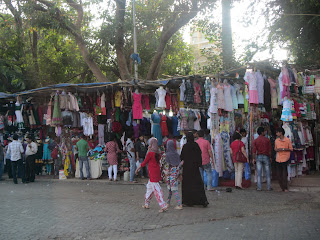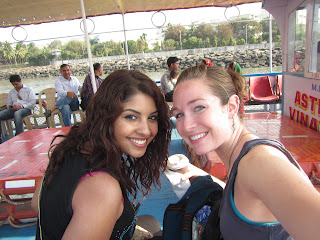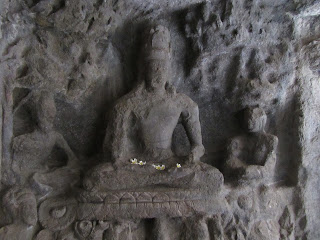~The Gateway to India and Taj Hotel~
On the ferry to go see the Elephante Caves
~ ~ ~ ~ ~ ~ ~ ~ ~ ~ It is my last day here in India and I can't believe how fast the month flew by. I remember when I first arrived. There was so much to take in- the traffic, people everywhere, high rise buildings next to slums, the intense smells, extreme contrasts everywhere, vibrant bright colors in the clothes and food, and an abundance of stuff being sold in the markets. I remember how nervous I was when I first started taking the cabs and rickshaws to work. The first couple days, after telling them, "Hinduja Hospital jaana hei." (I need to go to the Hinduja Hospital), I would draw a little map of buildings and landmarks as we drove around. There were a few times after work, late at night, when a cab driver would go off the path. One time a cab driver turned left into a dark alley and then into a parking garage type thing. My heart started racing and I said, "Hum kidthar hei? Link road jaana hei." (Where are we? I need to go to Link rd.) hoping he knew I was paying attention and that I spoke a little Hindi... He just replied, "haa, teekay teekay." (yea, ok, ok). And then turned back out on the familiar road. In the beginning this happened quite a few times, sometimes as short cuts but most of the time as an extra long route so it would charge me more. After drawing my little maps, I knew where I was and could tell them where to go. I would say, "Left leegee yay." "Right leegee yay", or "Seedaa" (take a left, right, straight). I found myself tilting my head side to side like they do to communicate and trying my best to speak Hindi. I felt more respect from them and they didn't try to take the long route anymore. At first I was terrified with the lack of rules, no seat belts, babies being held on motorcycles as they zipped through the cars and traffic. My stomach would clench a little as they disregarded stop lights at intersections. They would speed into a cluster of cars, honking their way through, and whoever was the most aggressive won. In the beginning of the month I remember wondering if I was going to make it to work each day. In the book Shantaram, he says you just need to "surrender to the city." I found myself surrendering and just accepting the way things were, hoping everything would be ok. I surrendered to the city, and by the end, I had grown quite fond of it.
- - - - - - - - -
Today, my roommate and I are heading through South Bombay to the ferry that will take us to the Elephante Caves on the island of Gharapuri. I am excited for my one last adventure of India. As the cab stops in traffic, I see a woman walking up to the window and she starts the regular constant tapping. They are especially persistent when they notice foreigners. I forget that I'm supposed to ignore it, and look over at her. She is thin, too thin, and I can see the dirt on her hands and face. She is holding a little boy, maybe 2 years old, who is malnourished and naked. No one wears shoes. She taps on my window asking for food and money. It's constant and she won't look away. It's hard to look into her eyes. I hate the feeling of doing nothing. Every time, they stand there with such desperation and intensity, pleading for help. I have learned that this is part of their livelihoods. They send the children and women out to beg, especially those who have been abused, burned, or with physical ailments to attract more attention. I have heard stories of Dharavi, the largest slum in India, and have met people who grew up there. To them, it's what they know. It's just life. It's the way it is. They learn to survive in it and it becomes part of them. They embrace what little they have. And still after a month of being here, I can't seem to ignore it.
Driving through the streets in India is a very different experience than driving to work in America. Early in the morning (9am is their early), people start waking up and getting started with their day. Venders start appearing with their wooden carts filled with bright fruits and veggies strategically piled into pyramids. With everything being balanced on one or two wooden wheels, there is a skinny guy holding two handles in the front and lugging the cart down the road to set up his stand. There are women who spread out tarps or sheets on the ground and then arrange their bright array of vegetables. They organize them on the tarp by color. There are bright red peppers, then orange and yellow. Then green beans, asparagus, green peppers, lettuce, and cabbage. Everyone has a different assortment of things to sell as they sit on the sidewalk along the side of the street. Next in line are the little wooden stands where people sell paanch and other tobacco products, then rows and rows of booths with brightly colored saris, selwars, sandals, toys, jewelry, scarfs, hand crafted wood, and many many more items. There is just a plethora of stuff lined up along the streets as people weave in and out on their way to work. Directly next to these and among these markets are little huts and areas of sidewalk where people sleep. They slowly start waking up. Where you think it's just a bundle of a sheets, you see it start moving and a mother with two children will slowly emerge from their slumber. Some have made little homes made out of wooden sticks placed in a square with a sheet or tarp draped over the top. They have little blocks of stone or wood next to these huts where they make little fires to cook. This is the cause of many of the burns we see in the hospital. Little kids run around and play along the busy streets. Some of them wear a t-shirt, some of them get shorts as well, and many of the them (especially the very tiny ones) are simply naked. Most of them can't afford shoes or underwear. In the morning they will squat on the bare ground in little groups and either talk or pray when it is time. Some of the little families living on the streets will set aside the sheets that they just slept on and start bringing out veggies to sell for the day. Next to them are heaps of trash. Sometimes I look out and there are goat, dogs, humans, and cows searching for goodies among the piles of trash.
I remember my first impression when I arrived. It was shocking to see the contrast of extreme wealth and extreme poverty living side by side. A month later I've become a little more used to it, but it's still hard for me to take in and accept. Most people here just accept the way things are. They disregard the shock factor because 'it's just the way life is here.' They ignore the beggars that come up to the window and just go about their daily lives. For me, I have seen poverty in other countries. I work very closely with our homeless in Detroit through free health care clinics, shelters, and other volunteer activities. I have been to Central and South America and have worked with underserved populations. But this is a different kind of poverty than I have ever seen. In the US, we have shelters where many of our women and children can stay. Many of our homeless patients who live on the streets suffer from mental illness which prevents them from getting the help they need and the help that's available for them. We have shelters, free clinics, medicaid, and medicare. In Central and South America, it seemed like the whole town or area had very little. They lived in wooden or cement huts and worked very hard to gather their food and water, but they all worked together. No one had much, so they were each other's support system. When we traveled for medical relief trips, they were so thankful for our presence in helping however we could. They were very hard working but seemed relatively content with what they had.
Here in Mumbai, two things especially stand out to me. First of all, these huts, where people on the streets have made into homes (and is similar to how they live in Central and South America), are smack in the middle of the city, scattered among magnificently beautiful high rises, where wealthy people pass through as they walk to work. There are homeless children without shoes, clothes, food or water sleeping on the same street that a fancy Mercedes-Benz would drive by. It is like two completely different worlds were shaken up in bottle and then poured out into the city of Mumbai. No wonder there is such a desperation in their pleading. Those living in such extreme poverty are directly next to those with unimaginable wealth. They see it everyday, taunting them. No wonder they seem so desperate. Then the second thing that is still hard for me to take in, is the amount of children on the streets. They run around, in and out of traffic asking for money and food, and play on the sidewalks without supervision. They are incredibly thin and many are naked or just have a t-shirt. Some have already suffered from injuries or amputations. I am told over and over during my stay in India to ignore it, look away, it's just the way they live, it's simply the way life is for some people here. But still after a month, I can't look away. My stomach clenches when I see these little children living on the streets like this. It's just something I can't seem to get used to...
And now on my last day, as this woman tap-tap-taps on my window asking for money. I know I need to pretend to ignore it. Pretend I don't see that look in her eyes, or the little boy in her arms who doesn't have clothes. I could give them food, clothes, or money, but the solution to the problem is much much bigger than that. Here on my last day in India, I am reminded of the issues of poverty and health disparities that exist around the world. Hopefully one day we can make change. Perhaps one day, the world will become a better place...
- - - - - - - - -
My roommate and I pass through the Gateway of India to take the ferry out to Elephante caves and explore the historical Hindu and Buddhist carved stone. We are entertained by the hundreds of monkeys running around us and trying to take things from the tourists. I am amazed at these historical pieces and enjoy my last site seeing journey in India. After our day on the island, we enjoy an amazing lunch at The Yoga House, and then head back home so I can pack for my 30 hours of traveling back to the States.
On my last day, I think about my observations on my drive to work every morning, and the interesting cases we saw at the hospital (many contracture burn wounds, amputations, flaps, cleft lip and palates, breast reconstruction, and others). I think about the extreme poverty and the wealth living side by side, and the health disparities between the rich and the poor. And then I think about my amazing weekend in Kerala thanks to Wazim and his friends/family and how very fortunate I am. I think about my month staying at Richa's apartment. I remember that first weekend when she took me out on the rickshaws, teaching me how to speak Hindi and get around on my own. I would be completely lost without her! She opened up her home and was unbelievably generous to me the entire month. I was also very fortunate to work with such a great attending, resident/fellow, and team throughout the month, and have learned a lot about the health care system of India. I feel so incredibly thankful for all the help and support from the people here in India, and that I was able to experience yet another part of the world. I feel overwhelmed with gratitude.
As William Ellery Channing said, "Nothing which has entered our experience is ever lost."
I will never forget India. It has a special place in my heart :)
~ ~ ~ ~ ~ ~ ~
My Drive to Work
Rickshaw driver
Just passing Bandra
the contrasts....
- - - - - - - - - - - -
People setting up markets
~ ~ ~ ~ ~ ~ ~ ~ ~ ~ ~ ~ ~
The Elephante Caves
Driving over the Sealink
The Haji Ali Mosque
Gateway of India
On the ferry
He stole Richa's water bottle....
That little monkey just stole from the guy in the blue
Lunch at Yoga House :)
Gonna miss my Mumbai roomie!
~ ~ ~ ~ ~ ~ ~
Goodbye India!
नमस्ते
namastē
~ ~ ~ ~ ~ ~ ~




















































